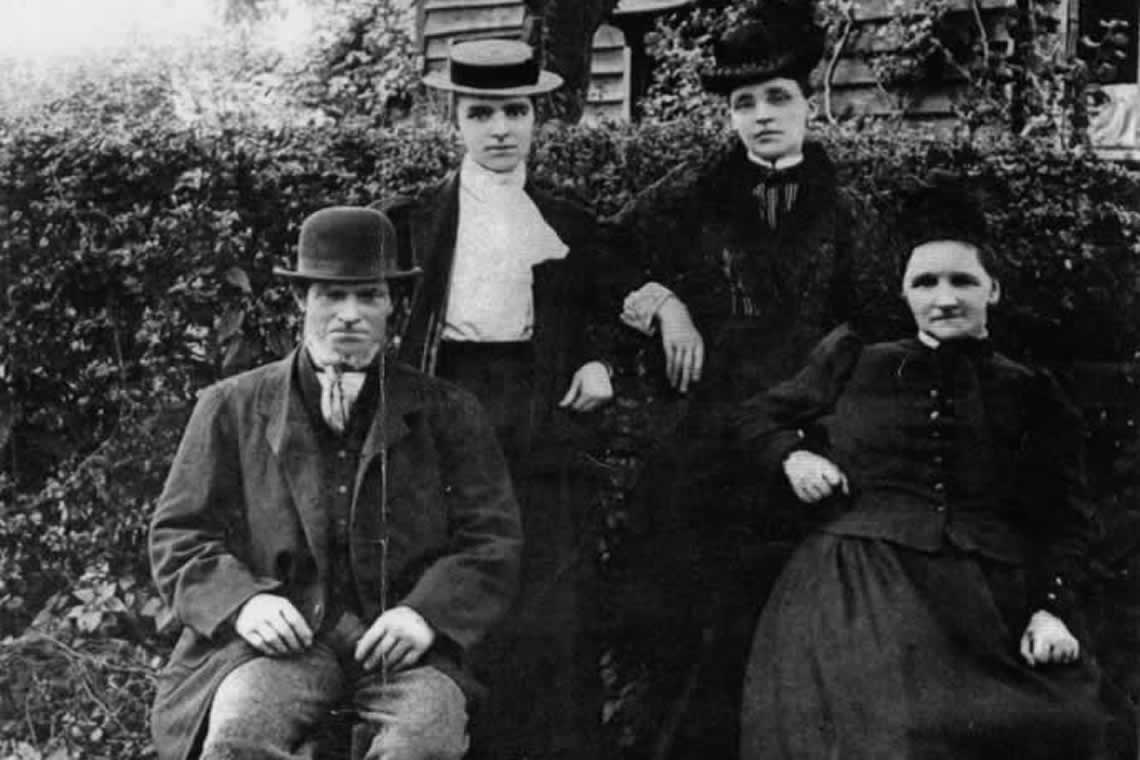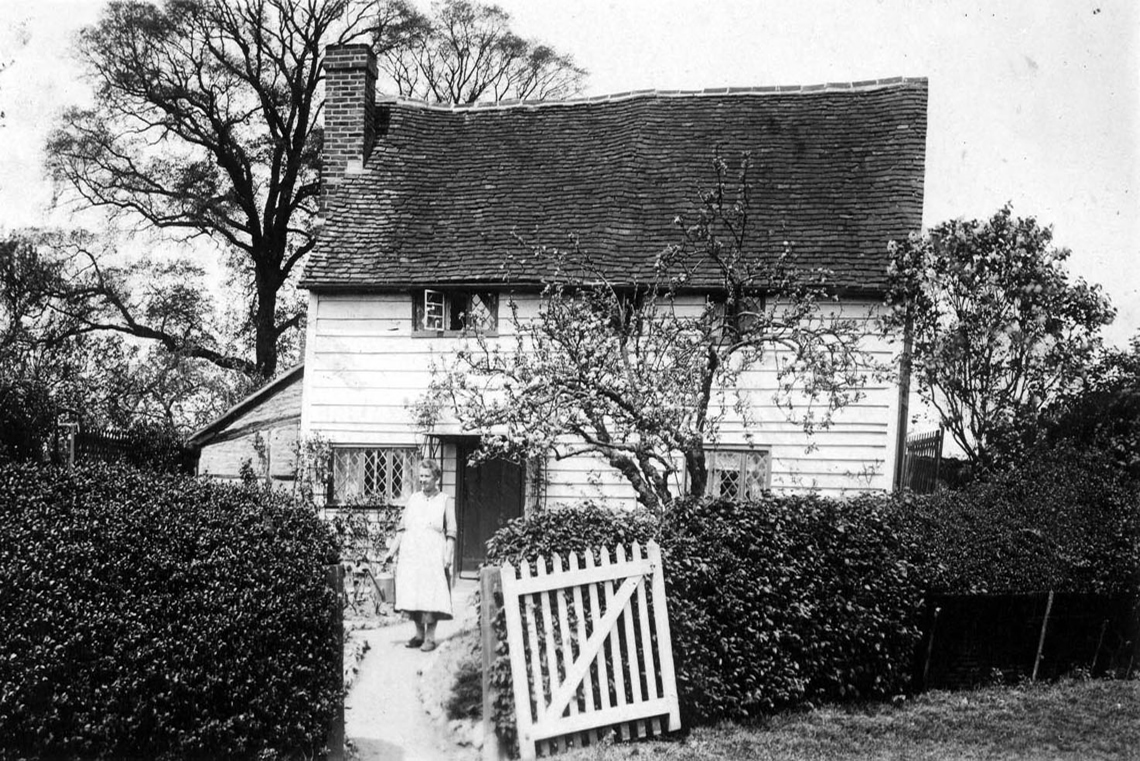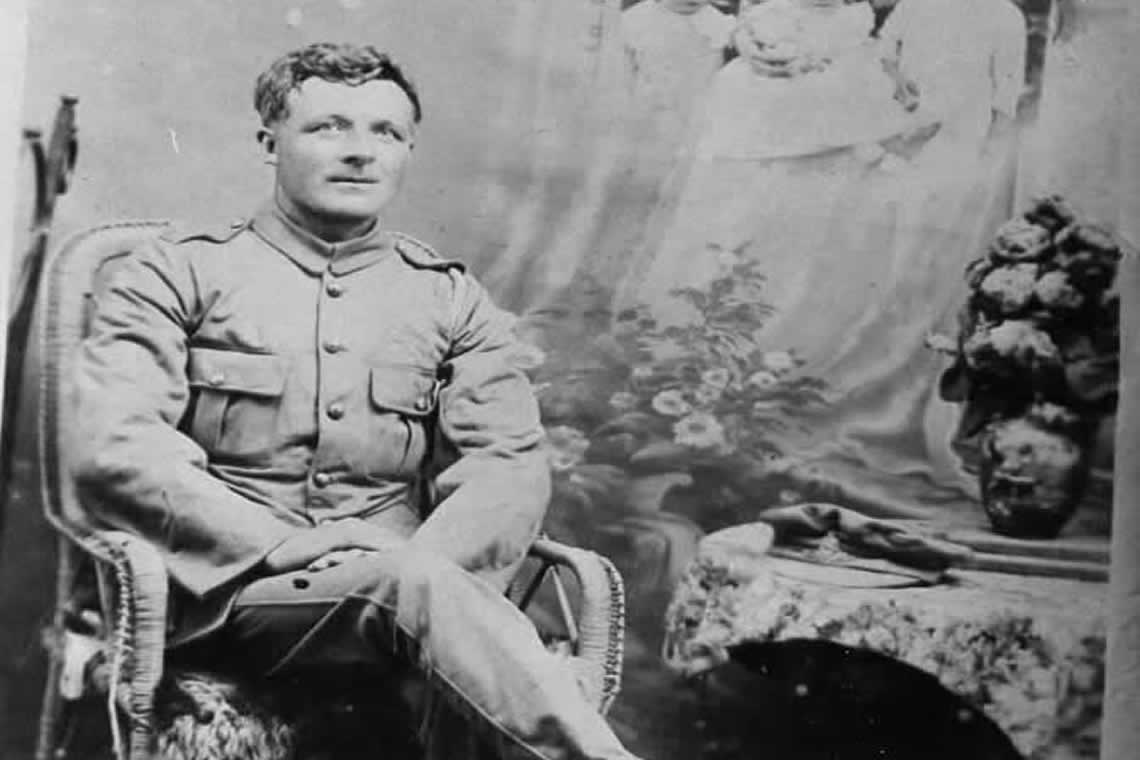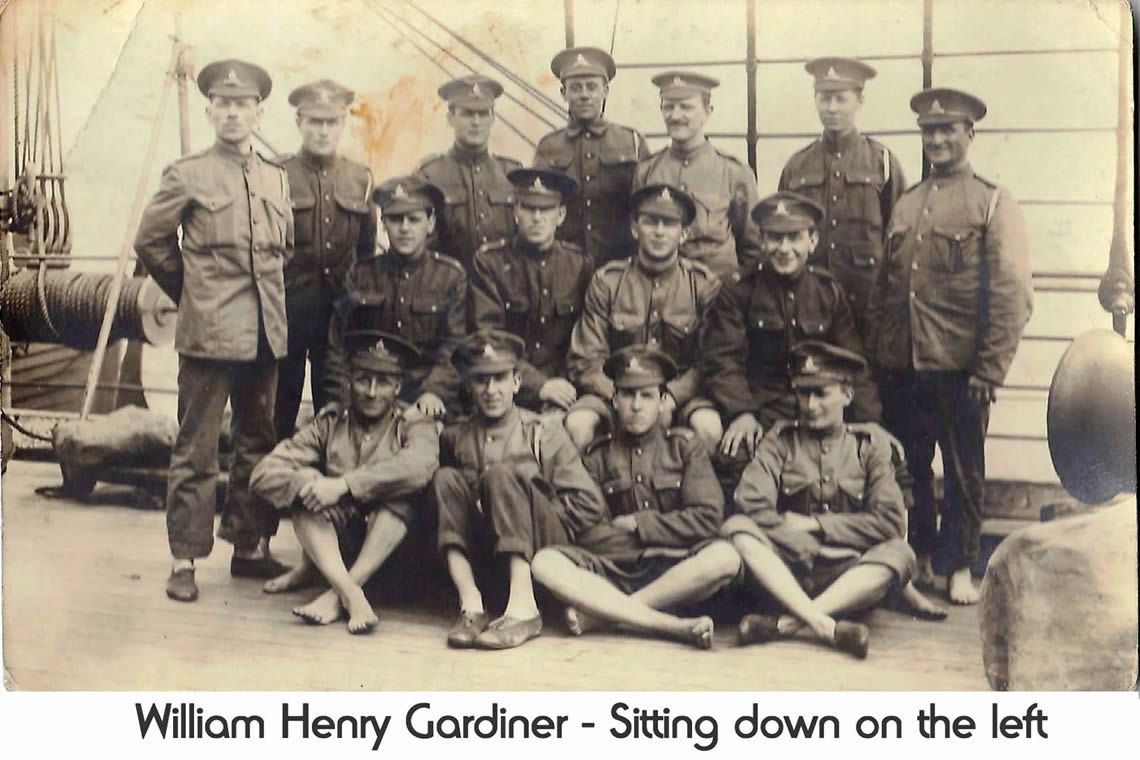Quick View of lemsford Parish - Click on Star
The Tully family are a special interest to one of our leading member Doreen Wright. The find out her interest Click Here to read her article on William Henry Gardiner. Here is an extract:
William was born on 6th August 1889 his mother was a domestic servant in London earning 4/7 per week. On 26th September 1889 he was boarded out by the Waifs and Strays Society to Mrs Susan Tuley aged 54 who lived along with her husband John aged 58 , their daughter Louisa and Harriet Hill (daughter by Susan’s 1st marriage) in a Clapboard House in Cromer Hyde. She already had two other Waifs Arthur Seymore and Roland Rouse. William went to st Johns Lemsford on 13/6/1894 and left 8/1/1904 to work as a Gardener at Brocket Hall
William remained with his foster parents even after the Society removed him from their books in 1903 as he was considered old enough (14years old) to take care of himself. He married Susan Tuleys’ granddaughter Mabel Hill on 4th Nov 1911, they all lived in the Clapboard Cottage in Cromer Hyde. The cottage had two double bedrooms, a large front room (used as a bedroom by Susan and John Tuley), a big living room, a narrow scullery and a dairy lean to at the back. Outside was a large washhouse with a copper and a baker’s oven. Read More.
William Henry Gardiner
William was born on 6th August 1889 his mother was a domestic servant in London earning 4/7 per week. On 26th September 1889 he was boarded out by the Waifs and Strays Society to Mrs Susan Tuley aged 54 who lived along with her husband John aged 58 , their daughter Louisa and Harriet Hill (daughter by Susan’s 1st marriage) in a Clapboard House in Cromer Hyde. She already had two other Waifs Arthur Seymore and Roland Rouse. William went to st Johns Lemsford on 13/6/1894 and left 8/1/1904 to work as a Gardener at Brocket Hall
William remained with his foster parents even after the Society removed him from their books in 1903 as he was considered old enough (14years old) to take care of himself. He married Susan Tuleys’ granddaughter Mabel Hill on 4th Nov 1911, they all lived in the Clapboard Cottage in Cromer Hyde. The cottage had two double bedrooms, a large front room (used as a bedroom by Susan and John Tuley), a big living room, a narrow scullery and a dairy lean to at the back. Outside was a large washhouse with a copper and a baker’s oven.
William at one time worked at Hatfield House, then employed at Brocket Hall. At the time of his marriage his pay rose from 15shillings to 17shillings 6pence a week on his wedding day. This was followed by 2shillings 6pence on the birth of each child. Anne Louise was born in 1912, William George in 1914, Lily Rose 1916 and Lucy in 1931.Susan Tuley died in July 1917 she was born, lived all her life and died in the same cottage, she was one of the oldest parishioners’ in the village.
Lemsford News August 1917
Obituary – On Tuesday, 24th July, the funeral took place of Mrs Tuley of Cromer Hyde, who passed away on the 19th. after an illness of many weeks. In her we have lost one of our oldest parishioners, her long and useful life of 83 years has been spent in the house in which she was born, and in which she died. We should like to add a word of sympathy for William Gardiner, who was brought up by Mrs Tuley; he is now in India with the R.H.A. We are sure he will feel his loss very keenly. In Dec 1918 John Tuley died in the Union Infirmary, Hatfield he had been ill for quite a while.
Lemsford News January 1919
We have to announce the death of Mr Tuley of Cromer Hyde, after many years of increasing infirmity. For his sake we cannot regret that he has been taken. It is indeed a case of being delivered from the burden of the flesh.
The following information was taken from Williams military records on Ancestry.6th June 1916 William first joined for duty at Woolwich; in March 1917 was called up for service, where he became Gunner Gardiner W.H. Army No. 206280. After basic training he was posted to ‘W’ Battery R.H.A. He served in India and Mesopotamia.
On 21st April 1918 he was admitted to the Field Hospital where he remained until 19th May 1918 he then re-joined his troop. Unfortunately he was re-admitted to the Field Hospital 7 days later on 26 May 1918 and remained in there until 24th August 1918. William had to remain in India for most of 1919 to help with the civil unrest. He was demobilized on 15th September 1919 and embarked on-board the ‘MARGHA’ on the 16 September 1919 for the U.K.
A family album held a collection of post cards of views sent from such places as Bombay, Kirkee, Poona, Musoorie, Cawnpore, Umballa, with scenes of the British Cemetery at Meerut, few carried a date and postmarks were blurry.
On his return to Cromer Hyde his 8 year old daughter Annie ran from the gate to her mother shouting “Daddy is coming up the lane” quite remarkable in the circumstances as she hadn’t seen her father since she was 4 years old.
An extract from his grandson’s family history
These three years away fighting had changed grandfather, he was always reticent about his military service, at times however hints at being in a midnight engagement proved to be more than a mere moonlight saunter than he would have the family believe. The records shows that on the 5/6th March 1918, ‘W’ battery was covering the Aleppo Road from the Wadi Hauran, on the Euphrates River. It was acting in close support of a cavalry charge which rounded up a thousand or more Turks from a force attempting to make a fighting retreat north. He was in the thick of things in October, on the banks of the Tigris River and was at Mosul when it fell without a fight.
Some of the memories of Annie Louise Gardiner
During the war we would get a lot of the people from the village up our old house, as they thought it was ‘safe’ from the Zeppelin’s particularly if there was moonlight they thought our house was the only one whose windows didn’t show up. Whether or not this was correct I really don’t know. I recall watching from the garden on the 3rd September 1916 the airship coming down over Cuffley; it was like a flaming cigar. We also saw the reflection and heard the explosion of the Silver Town Munitions Factory in West Ham on the 19th January 1917 blowing up.
On Armistice in 1919, the big girls at school (Lemsford) rang the school bell and broke the rope (it never got mended) and I was heaved up to grab the end. Our family belonged to the “Children’s Union”. (Part of the Waifs and Strays Society). We use to attend meetings and help raise funds. In September some of the fields belonging to the farm used to have lots of mushrooms, the women from the bottom of the lane used to come up about 5 am with clothes baskets to pick them and take them to St. Albans market.The journey to school used to be fun as we used to run behind a milk cart (with churns for Hatfield Station) or a Foden lorry, doing the same job. There were no school uniform the only thing we had was a little pill box hat, kept on by elastic. We had to take our dinner to school and in the dinner hour used to go down to Lemsford to the little shop which sold everything from tallow candles to bacon, sweets and cottons, to get anything wanted at home.
In October we had two weeks off from school for potato picking, and most children were expected to earn enough to buy their winter boots. We moved from the Clapboard Cottage to a brick built house in Cromer Hyde about 1920, a family called Welch lived there for a while before Mr and Mrs Cochrane moved in.
I used to go with Grandfather Walby when he was haymaking and also when he was cutting out the hay bales. I turned the handle of the big whetstone and helped to make the straw bands to tie the bales. (No string was used)I won a scholarship to the Hatfield High School for Girls but was unable take it up because it was too far to travel the few miles there but also because the Prize did not include books or uniform. My first job was as a general servant but was required in 1929 to nurse my mother as she’d had a heart attack brought on by the long years of undernourishment during WW1 and the constant demands of my grandmother Harriet’s illness. The job at Brocket Hall was waiting for Father when he came home from the war and he remained there until 1935 when he was helped by the head gardener Mr Pateman to obtain a job in Surrey.
Lemsford Local History Group have a large archive of documentation & images for all aspects of history in Lemsford Parish. For our website we require your help to update and provide memories, facts and images about all aspects of the past in Lemsford Parish. Please Contact us on info@lemsfordhistory.co.uk
Andy Chapman LLHG
Enjoy Our Images
All photographs, images, PDFs and text used on this website are for your enjoyment. Please remember all photographs and material used on this site MAY NOT be copied, in whole or in part, or be duplicated to another computer, transmitted, published, reproduced, printed, hotlinked, etc. without the express written permission of the Lemsford Local History Group. To apply to use an image or article Contact Info@lemsfordhistory.co.uk
| Census | Name | Age | Relationship | Location | Occupation | Birthplace |
|---|---|---|---|---|---|---|
| 1861 | Susan Hill (Tully) | 27 | Daughter | Cromer Hyde | Straw Platter | Hatfield |
| 1871 | Susan Hill (Tully) | 37 | Daughter | Cromer Hyde | Platter | Hatfield |
| 1881 | John Tully | 51 | Head | Lemsford | Sunstroke | Harpenden |
| 1881 | Susan Tully | 47 | Wife | Lemsford | Cromer Hyde | |
| 1881 | Mary Tully | 6 | Daughter | Lemsford | Scholar | Cromer Hyde |
| 1881 | Louisa Tully | 3 | Daughter | Lemsford | Scholar | Colney Heath |
| 1891 | John Tully | 62 | Head | Lemsford | Pensioner | Harpenden |
| 1881 | Susan Tully | 55 | Wife | Cromer Hyde | Hatfield | |
| 1881 | Louisa Tully | 13 | Daughter | Lemsford | Scholar | Hatfield |
Lemsford Local History Group
The Lemsford Local History Group, formed in 2001, is interested in all aspects of the history and the people of this area - both ancient and modern. We welcome correspondence from anyone who shares this interest.The group archives now include a significant number of photographs and documents, as well as records of baptisms (to 1985), marriages (to 1970), burials (to 2003) and memorial inscriptions (to 2003) from the St John's parish church registers. Records of births, marriages and deaths before the consecration of the church in 1859 will be found in the registers of Bishop's Hatfield parish. The archive also contains admission records for the village school - St. John's Church of England Junior Mixed Infants school - since it was first opened in 1872







